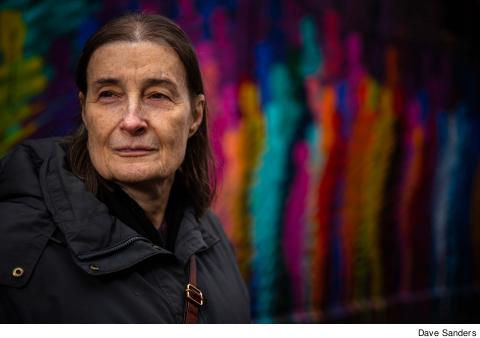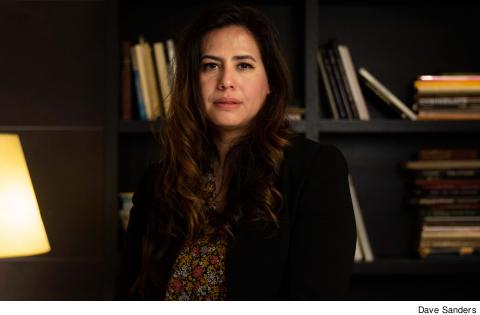York College retaliates against activists
 |
Editors note: The original version of this article stated that a member was “disciplined” by management. She was not formally disciplined. This article has been updated.
Freya Pritchard, a professor of mathematics and computer science at York College and a PSC alternate delegate, simply wanted to protect the health and safety of her fellow union members. For that, she believes she was retaliated against by her college’s administration, a move that the York PSC chapter says is part of a broader trend of trying to suppress faculty activism on the Queens campus.
In early September of last year, higher education officers alerted their PSC chapter about a busted pipe that had caused flooding in the Academic Core Building where their financial aid office was located. A delegation of union activists, including Pritchard, participated in a safety walk-through of the building on September 23, along with Charles Bozian, York’s interim vice president for finance and administration.
On the walk-through, Pritchard brought up a concern about the existence of mold in the building, which she had said had been a problem in the past. While Pritchard remembers that Bozian was initially dismissive of her concern, he instructed Pritchard to alert him immediately if she saw any instances of mold, she told Clarion.
‘SPECK OF MOLD’
Following the meeting, Pritchard returned to her office in the Academic Core Building and found a small speck of mold on one of her books, something that has happened many times in the past. She then went to Bozian’s office and demanded to speak to him, but was informed that he was on Zoom call. When he eventually emerged, she says she showed Bozian the speck of mold on the book while standing about five feet away from him.
“He started freaking out,” Pritchard said. “I was told to leave, and I did. I cleaned the mold off the book. I assumed that was the end of the story.”
But it wasn’t. In November, Pritchard was informed by York administration that she was under investigation for threatening Bozian with a moldy book, a charge she believed was absurd considering she was simply trying to show it to him. In retrospect, Pritchard wished she had brought union representation to the meeting to act as a witness. She would have been entitled to Weingarten representation in an investigative meeting.
On December 21, the college’s chief attorney, Russell Platzek, issued Pritchard a “letter of guidance,” stating that while Bozian was in a meeting when Pritchard arrived at his office, she “insisted that his meeting be interrupted.” When Bozian came out to talk to her, she held “out the book, saying it was contaminated with mold,” and she “could be heard using abusive language as [she] left the office.”
Platzek said that it “is substantiated that [Pritchard] acted in a disruptive manner” and that she “engaged in behavior that placed others in reasonable fear for their safety.” While he did concede that “it is assumed that the actual danger of mold from the book was minimal,” there was no way for the people in Bozian’s office to know that at the time.
A letter of guidance in CUNY procedure could be perceived as a relatively minor action against a senior professor, though a similar action would be more serious for a non-tenured faculty member. Pritchard had feared after being told there would be an investigation that the college might issue something more substantial, like a letter of reprimand. But a letter of guidance is no mere slap on the wrist, either. The letter will be placed in her personnel file – where she has a union right enshrined by Article 19 in the PSC-CUNY contract to submit comments, rebutting information in the letter. The letter of guidance does state that further misconduct could result in more serious consequences, including termination.
CHILLING EFFECT
Pritchard and Ian Hansen, the York College PSC chapter chair, say the letter could have a chilling effect on union organizing and sends a message that aggressive health and safety advocacy could land faculty, professional staff or anyone else in trouble.
“The incident described in the letter of guidance, even to the extent their account is accurate, should have simply tipped off the administration to two things: one, there is indeed mold in the building, and two, faculty and staff are angered at having their repeatedly expressed concerns about this dismissed,” Hansen told Clarion. “The proper response of [Interim Vice President] Bozian to Freya should have been, ‘I’m so sorry for appearing to have dismissed your concerns. We will look into the situation right away.’”
Hansen, an associate professor of psychology, views the action against Pritchard as an example of DARVO (deny, attack and reverse victim and offender), is a common manipulation strategy for psychological abusers.
ABUSIVE TACTICS
“This kind of DARVO inversion of reality could have a chilling effect on advocacy for the health and safety of college community members, as well as any kind of advocacy for the rights and welfare of PSC members,” Hansen said. “It could also, however, have an enraging and galvanizing effect that mobilizes more people to stand up for member health, safety and union advocacy rights. I hope it is the latter.”
Pritchard isn’t alone. Several other York faculty members have had troublesome run-ins with York administration after advocating for health and safety on campus.
“It is no coincidence, in my view, that several of us who were on the PSC-CUNY walk-throughs have been met with poor treatment following this,” said Donna Chirico, a professor of behavioral sciences at York. “As a former dean and longtime member of the York faculty, I was able to take Interim Vice President Bozian and [Executive Director of Facilities Management] [Onyekachi] Akoma into spaces that were not in the pristine condition as the newly renovated labs faculty were shown during the first walk-through. In fact, it is bizarre that I showed them spaces they had never visited previously despite the claim that they had assessed 95% of the campus. I had several negative interchanges with Bozian about the lack of key card access for faculty teaching on campus. He kept saying that everyone had access when this was not the case.”
PUNITIVE ENVIRONMENT
Fabiola Salek, a professor and the department chair of world languages, literatures and humanities, concurred that Pritchard’s case was typical of the punitive environment at the college. She added the college had a “very difficult administration and Bozian is not an outlier…. Tone is set at the top with the [college] president.”
 |
Salek recalled feeling the administration’s wrath during her time serving on the college’s Personnel and Budget Committee with York College President Berenecea Eanes. “At some point last Spring, the president’s harassment and outbursts against me were so bad that the [department] chairs presented the president with a statement of collegiality,” recalled Salek. “I was one of [Eanes’s] main targets because I did not fall in line.” Salek said she was “trying to protect our classes and faculty, as is my duty as a chair in my opinion.”
Salek noted that when Eanes became president in 2020, the meetings between the department chairs and the president became acrimonious.
“I’ve been a chair for a long term,” she said. “There were times when it was testy,” but she noted that under the current college president’s leadership, meetings with the chairs have been “so stressful and so inappropriate,” a style of leadership that Salek believes has trickled down to the rest of the college’s administration.
The PSC chapter is currently reviewing its legal options on how to respond to Pritchard’s case.
“The union is extremely concerned that one of our active members has been targeted for advocating on our behalf with one of the safety issues we have had,” Salek said.
ACTIVIST TARGETED
Even though the official response from York administration is relatively minor, Pritchard said the whole ordeal has been emotionally trying. She recalled her time at Adelphi University in Long Island, where she was fired as a non-tenured faculty member. “It is rather triggering; that can make it difficult,” she said. “I’m very mad because I feel I’ve been unjustly attacked.”
Pritchard believes “this is the most ridiculous thing that has happened in a long time,” but that the culture and fear of retaliation at the college is bigger than just this one incident.
“Other people said they felt they had been retaliated against,” Pritchard said, referring to colleagues who have been afraid to speak up about health and safety problems. “There was nothing as overt as what happened to me, but people felt… their department would be deprived of resources as a form of retaliation.”
She added, “This issue of retaliation is a serious, serious problem.”

